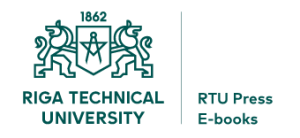Energoobjektu attīstības uzdevumu atrisināšana tirgus ekonomikas un nenoteiktības apstākļos
Summary of the Doctoral Thesis
Igor Moshkin, Riga Technical University, Latvia
The quality of our life directly depends on energy consumption. In the course of history, as new and new types of useful products were obtained from natural systems, more and more energy has been spent per unit of product. Energy saving as a result of increasing the efficiency of consumption actually leads to an increase in consumption, not a decrease. If a certain type of activity requires less fuel, the spare resources are used for other purposes. As a result, the degree of economic activity increases, as does the consumption of energy sources.
In order to meet such power consumption amounts, enormous power systems are continuously emerging in the world, expanding and undergoing modernisation. At present, a power system is a combination of thousands of generators and transformers, millions of kilometres of power transmission lines and billions of energy-consuming equipment units worldwide. Notwithstanding the fact that all the elements operate as a united system, there are a multitude of factors that influence the operating conditions, which means that it becomes necessary to change the operating modes of power facilities. It should be pointed out that many factors do not yield themselves to exact evaluation, measurement, or classification as probabilistic quantities; therefore, many decisions have to be made at the conditions of uncertainty, which lead to problems in large power systems regarding the efficiency and reliability of power supply. With the aim of finding one of the possible solutions, the researchers of the Institute of Power Engineering have developed a methodology for technical and economic substantiation of power facilities on the basis of the game theory, with a special emphasis on using the techniques of the cooperative game theory and distribution of additional profits according to the Shapley vector. The present Doctoral Thesis represents a continuation of the research started in this field, setting the goal of reviewing the possibilities of development of efficient operation of legally independent parts of a power system at market and uncertainty conditions. In order to achieve this goal, a number of tasks were addressed, such as: an analysis of work approaches and methodologies of individual parts of power systems in the process of designing and operations; substantiation of the effectiveness of cooperative behaviour; synthesis of an algorithm for solving the set tasks, using methods of the cooperative game theory in new examples of power projects. The thesis discusses examples of using the above methods in the designing of high-voltage and medium-voltage power transmission lines and in united systems of small HPPs and solar power plants; addresses/solves the tasks of increasing/maximising the profit and effectively distributing it for the design of a powerful solar power plant, using new calculations and a new designing model; and substantiates the advantageousness of cooperation between the producers and the end consumers. The methods and algorithms discussed in the Doctoral Thesis can be used by all the participants of a power system in order to achieve the most efficient use possible of its own and common resources.
Additional information
| DOI | |
|---|---|
| Publication type | |
| Hyperlink | |
| Defence date | 25.04.2019. |
| ISBN (print) | 978-9934-22-264-1 |
| ISBN (pdf) | 978-9934-22-265-8 |
| Format | |
| Pages | 33 |
| Published online | |
| Publisher | RTU Press |
| Country of Publication | Latvia |
| Publication language |
You must be logged in to post a review.




Reviews
There are no reviews yet.